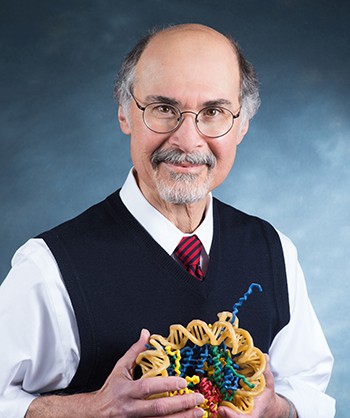

Professor

Higgins Hall 401A
Telephone: 617-552-3812
Email: anthony.annunziato@bc.edu
Molecular biology; chromatin assembly and histone modifications in mammalian cells and fission yeast.
Note: Prof. Annunziato's laboratory closed during the pandemic, and has not reopened. He is no longer accepting students.
The nuclear DNA of eukaryotes is organized with structural and regulatory proteins to form the nucleoprotein complex termed chromatin. The primary functional unit of chromatin is the nucleosome, a particle containing histone proteins and approximately 200 base pairs of DNA. Research in my laboratory has been directed toward understanding the processes involved in nucleosome assembly during DNA replication, and the regulation of chromatin function by histone posttranslational modifications. Just as the DNA in dividing cells must be replicated once each cell cycle, so too must sufficient histones (and other chromatin proteins) be synthesized to assemble nucleosomes on the newly replicated DNA. The proper assembly of chromatin during cell division is of vital importance, because the presence or absence of nucleosomes (and the precise positioning of nucleosomes with respect to DNA sequences) can determine which genes are transcribed, and when.
The faithful transmission and assembly of chromatin requires that many independent cellular processes be coordinated. As DNA is being replicated, histones are synthesized, then modified by enzymatic acetylation, transported to the nucleus, and assembled into nucleosomes. Moreover, supercoiled chromatin higher-order structures must first "unwind" to allow access to the DNA, and then condense again after replication is completed. The specific questions investigated in my laboratory included: the modification status of parental histones that are segregated to progeny chromosomes, and the mechanisms of histone deposition onto newly replicated DNA; the involvement of histone acetylation and other epigenetic modifications in nucleosome assembly, and the properties of enzymes involved. The experimental approaches have included biochemical and genetic studies, and the use of antibodies directed against specific histones and histone modifications.
Annunziato, A.T. 2015. The Fork on the Road: Histone partitioning during DNA replication. Gene 6:353-371.
Annunziato, A.T. 2012. Assembling Chromatin: the Long and Winding Road. Biochim. Biophys. Acta 1819:196-210.
Tong K., Keller, T. Hoffman, C.S., and Annunziato, A.T. 2012. Schizosaccharomyces pombe Hat1 (Kat1) is associated with Mis16, and is required for telomeric silencing. Eukaryotic Cell 11: 1095-1103.
Benson, L.J., Phillips, J.A., Gu, Y., Parthun, M.R., Hoffman, C.S., Annunziato, A.T. 2007. Properties of the type B histone acetyltransferase HAT1: H4 tail interaction, site preference, and involvement in DNA repair. Journal of Biological Chemistry 282(2): 836–42.
Benson, L.J., Gu, Y., Yakovleva, T., Tong, K., Barrows, C., Strack, C.L., Cook, R.G., Mizzen, C.A., and Annunziato, A.T. 2006. Modifications of H3 and H4 during chromatin replication, nucleosome assembly, and histone exchange. Journal of Biological Chemistry 281: 9287–9296.
Annunziato, A.T. 2005. Split decision: What happens to nucleosomes during DNA replication? Journal of Biological Chemistry 280: 12065–12068.
Benson, L.J., and Annunziato, A.T. 2004. In vitro analysis of histone acetyltransferase activity. Methods 33: 45–52.
Annunziato, A.T., and Hansen, J.C. 2000. Role of histone acetylation in the assembly and modulation of chromatin structures. Gene Expression 9: 37–61.
Chang, L., Loranger, S.S., Mizzen, C., Ernst, S.G., Allis, C.D., and Annunziato, A.T. 1997. Histones in transit: cytosolic histone complexes and H4 diacetylation during nucleosome assembly in human cells. Biochemistry 36: 469–480.
Annunziato, A.T., Eason, M.B., and Perry, C.A. 1995. Interaction between methylation and acetylation of arginine-rich histones in cycling and arrested HeLa cells. Biochemistry 34: 2916–2924.
Sobel, R.E., Cook, R.G., Perry, C.A., Annunziato, A.T., and Allis, C.D. 1995. Conservation of deposition-related acetylation sites in newly synthesized H3 and H4. Proceedings of the National Academy of Sciences of the USA 92: 1237–1241.
Perry, C.A., Dadd, C.A., Allis, C.D., and Annunziato, A.T. 1993. Analysis of nucleosome assembly and histone exchange using antibodies specific for acetylated H4. Biochemistry 32: 13605-13614.